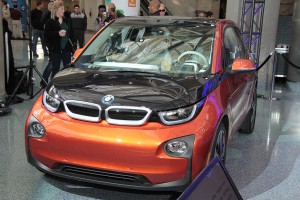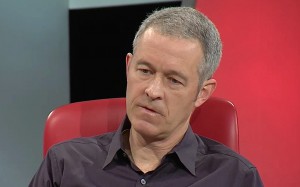
Could this be Apple's first EV? The tech giant is rumored to be talking with BMW about producing an electric autonomous vehicle version of it.
With Apple reportedly looking to bring an autonomous battery-car to market, there are growing signs the U.S. high-tech giant could pair with German automaker BMW, possibly to produce a customized version of the BMW i3 city car.
The two companies confirmed they met last year, but the discussions initially led nowhere, Apple apparently exploring the option of producing a vehicle entirely on its own. But the Silicon Valley firm has apparently decided to follow a path more like tech rival Google, which would mean partnering on a vehicle project rather than going into automotive manufacturing.
While Google has openly discussed its automotive ambitions – the company now rolling out a fleet of prototype, so-called “Google Cars” near its California headquarters, the notoriously secret Apple has been unwilling to discuss its plans.
But details have been slowly emerging. In May, Jeff Williams, Apple’s senior vice president of operations, tossed fuel on the fire, suggesting, “The car is the ultimate mobile device, isn’t it? We explore all kinds of categories. We’ll certainly look at those and evaluate where we can make a huge difference.”

Apple's Jeff Williams hinted at the possibility that the company may be looking at producing a car, calling it the "ultimate mobile device."
The Wall Street Journal in May reported that Apple’s automotive venture has been dubbed Project Titan.
Just last month, former Fiat Chrysler quality chief Doug Betts further fanned the flames when he updated his LinkedIn account to note he had gone to work for Apple – though he did not offer details of what he’ll be doing there, other than note it will be in “Operations.”
Observers note that with more than $200 billion in cash, Apple has the deep pockets to support an automotive venture. Even the most modern and expansive assembly plant, for example, would likely run less than $2 billion to erect, though vehicle development could add several billion more. But whether that would pencil in as a potentially profitable venture is uncertain. And as Google has been hearing from its shareholders, Apple might find resistance to that sort of expenditure.
(Apple hires former FCA quality chief. For more, Click Here.)
That could encourage it to find a manufacturing partner for Project Titan.
BMW could be a good one. It has expressed a strong interest in both electric propulsion and in autonomous driving. The Bavarian maker also has become a world leader in the development of advanced carbon fiber technology. The material is both strong and super-light, something that can help improve the safety, range and performance of an electric vehicle. Both of the vehicles BMW is producing as part of its new battery-based sub-brand, the BMW i3 and i8 use carbon fiber.
But the maker reportedly pulled back on a possible partnership with Apple because it was reluctant to release too much of its manufacturing know-how.
(Click Here for details about Apple expanding CarPlay’s capabilities with next update.)
According to various sources and news reports, the two companies parted on friendly terms. And while insiders insist there are no negotiations currently underway they are said to be keeping the lines of communications open.
“Two worlds are colliding here,” Peter Schwarzenbauer, BMW’s management board member in charge of the Mini brand as well as digital services, said in an interview with Reuters earlier this year. “Our world, focused on hardware and our experience in making complex products, and the world of information technology which is intruding more and more into our life.”
Apple will clearly have a growing presence in the automotive world. A number of makers have begun to embed its Siri voice valet system in their vehicles, and many manufacturers will soon follow with the Apple CarPlay system. Chevrolet plans to have it in 14 U.S. models by next year.
(To see more about FCA’s Marchionne talking to Apple’s CEO Tim Cook, Click Here.)
On the consumer electronics side, Apple has seen huge growth in smartphone sales since the introduction of the iPhone 6 last autumn. Were it able to generate just 1% of that sales volume for an Apple car it would have the potential to sell more than 1.5 million vehicles annually.
